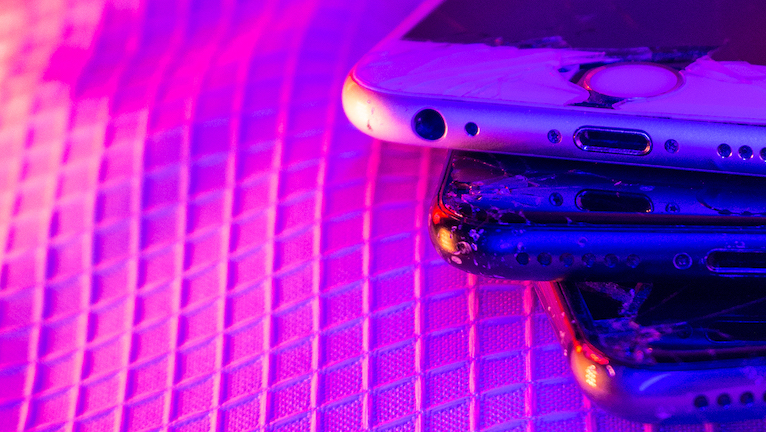Selfie is Clumsily, Painfully, and Firmly Real

Christine Quintana returns to the Festival of Live and Digital Art with Selfie, a screen-capture play co-produced with rice and beans theatre that examines the story of three teenagers who become entangled in a case of sexual assault is caught on camera.
We follow Emma (Emily Schoen) upon her return to Vancouver after a summer in Montreal, and the foggy events of a back to school party hosted by her best friend Lily (Tamlin Vetter) and her older brother Chris (Brett Hubich). Told through the literal lens of digital technology such as phones and computers, the internet and social media play a critical role in communication and evidence.
Talking over one another, punctuating with “umm” and “ahhh”, and talking too loudly to your crush are just some of the familiar embarrassing things that pull the audience into the reality of being 15, 16, and 17. The cast truly commits to planting their feet firmly in the self-conscious state of being that adolescents fall into, all while interacting with the technology needed to make the live-streamed performance possible. Even the way they carried their laptops and cell phones as they travelled throughout the set—a house that has been co-opted for this project—added to their stellar dedication. Their performances charmed the small intimate Thursday evening audience, invoking both laughter and pity from everyone in attendance.
I would be remiss if I didn’t give special mention to Vetter for her vapid but well-meaning characterization of Lily, who charmed the audience with her performance, making her character’s missteps even more bitter.
Quintana’s writing simultaneously walks the line of dramatic realism and an adult trying to sound like a teenager. Although the story itself is very real, the way Emma and her journey of overcoming assault by a trusted friend is characterized comes across a little preachy. After the immediate fallout of the party and the explosion of her private life online, Emma’s story simply culminates in a lecture to Lily and Chris on how this has altered her life, as if the takeaway should be that she is older and wiser for having been a victim of sexual assault, and the consequential trauma. This turn in the story feels like a “very special episode” of a sitcom from years past, and almost undermines what Selfie set out to achieve.
Whether or not the use of technology added to the production quality is questionable. It’s a mighty feat to try and livestream a performance with multiple cameras, locations, scene and costume changes! But unfortunately, some of the cracks in the production showed through elsewhere, meaning that any tech difficulties were harder to forgive.
One thing I was looking for when I went into the show was internet literacy, something that the creative team clearly had, but were perhaps too clumsy with. Transitions between scenes were stylized as TikToks and Instagram stories complete with comments appearing on screen in real time and generic pop music in the background. There was a strong attention to detail, but the execution wasn’t up to snuff. These interludes would take up to four minutes, and the “live” comments only came from a small handful of fictional accounts that weren’t engaging the characters or audience in any meaningful capacity. Even the selection of music at times offsets the serious subject matter of the scene prior or forthcoming. Had this example been the only occasion in which the audience’s extension of disbelief had been tested, I likely wouldn’t even have mentioned it. But it became too much to ignore when unavoidable issues came into play.
At one point, the audience was totally taken out of the story for a strange pause in the production in which we saw what one can only assume was the crew preparing for the final scene. It seemed so out of place that about half of the audience left, believing this to be the end of the show.
Overall, the story and the format didn’t seem to speak to one another. The story felt too intimate for any message about how the internet interferes with public and private life to hit home, and the screen capture style of streaming the live performances only served as distraction from the narrative itself.
I’m reminded of Jasmine Lee Jones’s Seven Methods of Killing Kylie Jenner and Silo Theatre production’s use of technology and social media, and feel that actual “onstage” interaction between the characters might have been appropriate here as well. Using real tweets as the base for the story, for example, is something that brought a gritty reality to the themes at hand. This in tandem with the screen heavy set (but not screen reliant staging) brought the audience into the narrative, a goal clearly attempted by the creative team of Selfie. Where Seven Methods of Killing Kylie Jenner prioritized the characters and the themes first, and the technology second, Selfie was ultimately beholden to the technology it was trying to critique.
Ideally, Selfie will take on many forms and find new life perhaps as a digital experience or a technology heavy staged production. The beauty of live theatre is that it always has the room to grow and change with the creative team, and with time.
Selfie ran at FoLDA from June 9 – June 11, 2022. Click here for more information.
